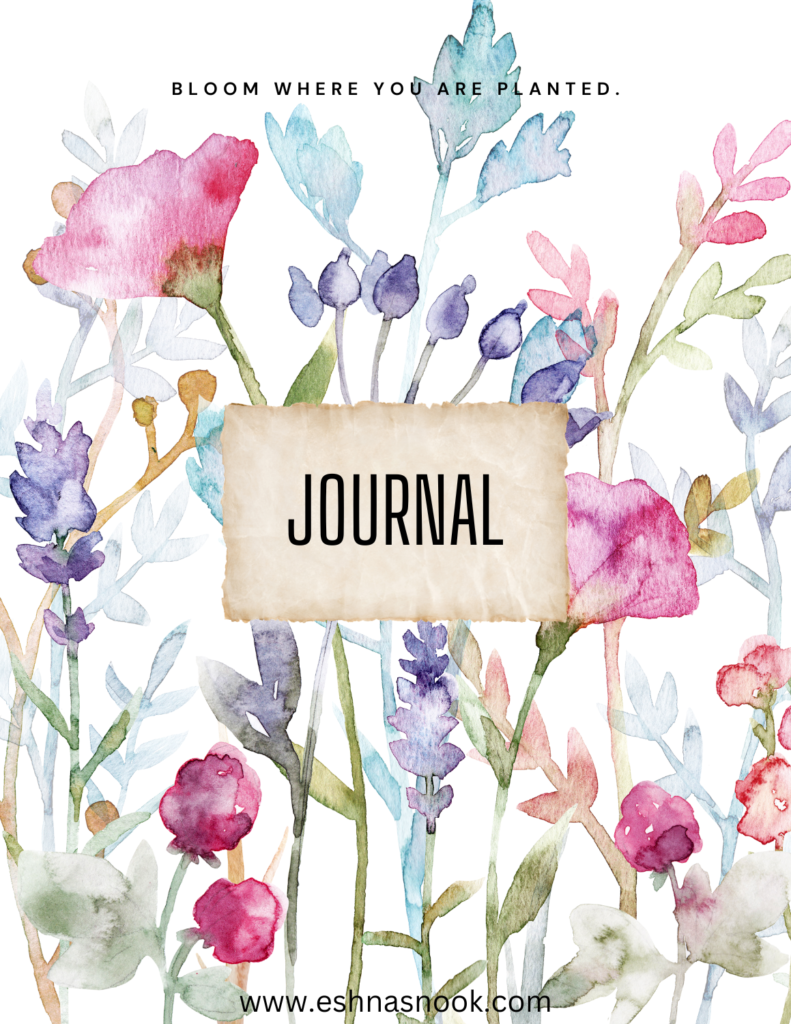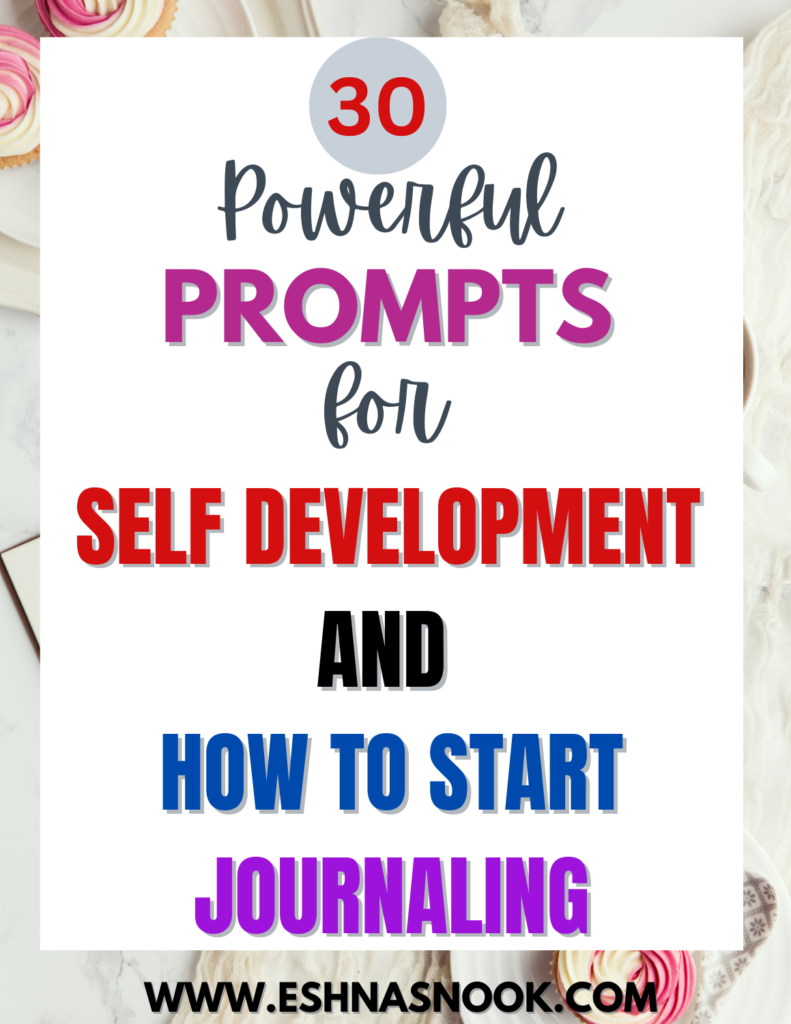The Ultimate Guide to Starting Journaling for Self-Improvement + 30 Powerful Journal Prompts
Journaling is a timeless practice that can greatly help with self-improvement.
Journaling is the act of writing down your thoughts, feelings, and experiences regularly. It involves keeping a personal record where you can express yourself freely, reflect on your day, set goals, and track your progress.
It’s perfect for understanding your thoughts, setting and achieving goals, and building a habit of reflection.

Journaling can be your best friend.
In this detailed guide, I will write about the benefits of journaling, how to start, the types of journals for self-improvement, and will also give you 30 powerful journal prompts to get you started!
Hey.. Please do not forget to follow me on Pinterest !!
Why Journaling?
Journaling is like a mirror reflecting your deepest thoughts, feelings, and experiences.
Here are a few reasons why journaling is helpful for self-improvement:
- Clarity of Thoughts: Writing down your thoughts helps you to organise them, providing clarity and insight into your mental processes.
- Therapeutic: Journaling can be therapeutic. It helps in managing stress, anxiety, and other strong emotions.
- Goal Setting and Achievement: By writing your goals and tracking progress, you can stay focused and motivated.
- Self-Reflection: Regularly reflecting on your experiences can create self-awareness and personal growth.
- Problem Solving: Writing regularly can bring out creativity and increase problem-solving skills.
Getting Started with Journaling
Starting a journaling habit can seem difficult, but with a few simple steps, you can easily include it into your daily routine.
1. Choose Your Medium
Decide whether you prefer a traditional paper journal or a digital one. Both have their advantages.
- Paper Journals: Many people find the experience of writing by hand more personal and engaging.
- Digital Journals: These offer ease and convenience, especially if you’re often on the go, and they can be easily backed up.
2. Set a Time
Set a regular time for journaling. It could be in the morning to set the tone for the day, or in the evening to reflect and look back on the day’s events.
Consistency helps in forming a habit.
3. Sit in a Comfortable Space
Find a quiet, comfortable space where you can write without interruptions.
This will help you focus and make it enjoyable.
4. Start Small
Begin with just a few minutes a day.
As you get more comfortable, you can slowly increase the time you spend journaling.
5. Be Honest
Journaling is for you, so be honest with yourself.
Write without fear of judgment or criticism.
6. Use Prompts
Journal prompts can be very helpful in getting started and maintaining momentum.
ALSO READ: HOW SETTING DISTRACTION TIME HELPS IN INCREASED FOCUS

Types of Journals for Self-Improvement
Learning about different types of journals can help you find the one that best meets your needs and goals.
Some popular types of journals for self-improvement:
1. Gratitude Journal
A gratitude journal is more about writing things that you are thankful for.
This type of journaling can shift your mindset towards optimism, positivity and appreciation.
2. Bullet Journal
Bullet journaling has more to do with to-do lists, calendars, habit trackers, and reflections.
It’s great for organisation, productivity, and for tracking personal growth.
3. Dream Journal
A dream journal involves recording your dreams upon waking.
This can help you understand your subconscious mind and gain valuable insights into your thoughts and emotions.
4. Goal Journal
A goal journal is dedicated to setting, tracking, and reflecting on your goals.
It can keep you focused and motivated, and it can help you break down large goals into manageable steps.
5. Reflection Journal
A reflection journal is used to ponder and reflect on your daily experiences, thoughts, and feelings.
It promotes self-awareness and personal growth by encouraging introspection.

6. Health and Fitness Journal
This type of journal is used to track your health and fitness activities, including exercise routines, dietary habits, and wellness goals.
It can help you stay accountable and monitor your progress.
7. Travel Journal
A travel journal is a great way to document your journeys, experiences, and reflections while travelling.
It allows you to preserve memories and experiences gained from different cultures and places.
8. Art Journal
An art journal uses drawings, paintings, and written reflections to help you express and explore your emotions and thoughts creatively.
30 Powerful Journal Prompts for Self-Improvement
To help you start with your journaling, here are 30 prompts that encourage self-reflection, goal setting, and personal growth.
1. Gratitude
List three things you are grateful for today. How do they make you feel?
2. Achievements
Reflect on a recent achievement. What steps did you take to accomplish it?
3. Challenges
Write about a challenge you’re currently facing. What can you do to overcome it?
4. Future Self
Describe your life five years from now. What are you doing, and how do you feel?
5. Strengths
Identify three of your strengths. How do they help you in your daily life?
6. Weaknesses
Identify three areas where you’d like to improve. What steps can you take to make progress?
7. Values
What are your core values? How do they influence your decisions?
8. Inspirations
Who inspires you and why? How can you incorporate their qualities into your life?
9. Goals
Write down your top three goals. What actions can you take today to move closer to achieving them?
10. Daily Habits
Reflect on your daily habits. Which ones are beneficial, and which ones need changing?
11. Self-Care
How do you practise self-care? What new self-care activities can you incorporate into your routine?

12. Mindfulness
Describe a moment when you felt completely present. What was the experience like?
YOU MIGHT LIKE TO READ: WHY WE GET BORED BY SOME PEOPLE
13. Failures
Reflect on a failure. What did you learn from it, and how has it helped you grow?
14. Dreams
Write about a dream you’ve had recently. What do you think it means?
15. Relationships
Describe an important relationship in your life. How can you nurture and improve it?
16. Stress
What causes you stress, and how do you typically respond? What healthier coping mechanisms can you try?
17. Happiness
What activities make you happiest? How can you incorporate more of them into your life?
18. Productivity
Reflect on a productive day. What made it successful, and how can you replicate it?
19. Motivation
What motivates you to get out of bed each morning? How can you maintain that motivation throughout the day?
20. Learning
What new skill or knowledge do you want to acquire? What steps will you take to learn it?
21. Impact
How do you want to impact the world or the people around you? What actions will you take to make this happen?
22. Health
Reflect on your physical health. What improvements can you make to live a healthier life?
23. Passions
What are you passionate about? How can you pursue your passions more fully?
24. Forgiveness
Is there someone you need to forgive, including yourself? How can you begin this process?
25. Environment
How does your environment affect your mood and productivity? What changes can you make?
26. Gratitude Letter
Write a letter to someone you’re grateful for. Explain why you appreciate them.
27. Success
What does success mean to you? How will you know when you’ve achieved it?
28. Regrets
Reflect on a regret. What did you learn from the experience, and how can you apply this lesson moving forward?
29. Mindset
How does your mindset affect your actions and outcomes? What steps can you take to cultivate a positive mindset?
30. Legacy
What do you want your legacy to be? How can you start building that legacy today?

Tips for Maintaining Your Journaling Practice
- Be Consistent: Try to journal every day, even if it’s just for a few minutes.
- Stay Flexible: Allow yourself the freedom to write about whatever comes to mind.
- Reflect Periodically: Review your past entries to see how you’ve grown and changed over time.
- Keep It Personal: Remember, your journal is for you. Write honestly and openly without worrying about others’ opinions.
- Have Fun: Enjoy the process. Journaling should be a rewarding and enjoyable activity.
Journaling for self-improvement is a powerful tool that can lead to greater clarity, emotional well-being, and personal growth.
By exploring different types of journals, following the steps outlined in this guide, and using the provided prompts, you can create a meaningful and lasting journaling practice.
So grab your journal, find a quiet spot, and start your journey towards self-improvement today.
Happy journaling!
Please Pin and share this post on How to Start Journaling.


